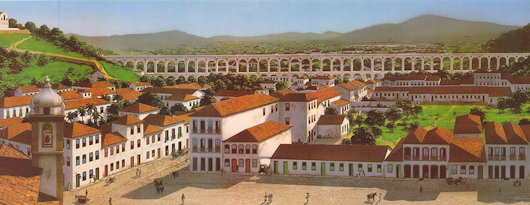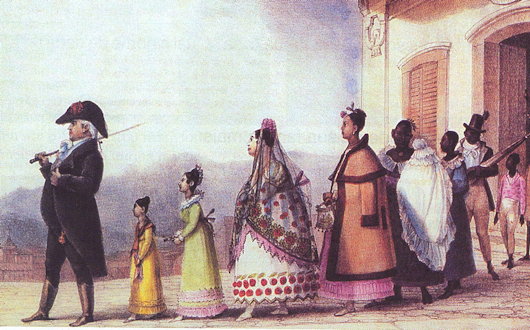
About Andrew Cusack
 Writer, web designer, etc.; born in New York; educated in Argentina, Scotland, and South Africa; now based in London.
Writer, web designer, etc.; born in New York; educated in Argentina, Scotland, and South Africa; now based in London. read more
News
Blogs
Reviews & Periodicals
Arts & Design
World
France
Mitteleuropa
Knickerbockers
Argentina
The Levant
Africa
Cape of Good Hope
Netherlands
Scandinavia
Québec
India
Muscovy
Germany
Academica

In Old Rio
The city’s administrative and electoral units were its parishes, and the tallest buildings were all church towers. The day of the colonial port began with the cannon shot announcing the beginning of harbour commerce, at half past five.
This was followed by the opening of shops and homes of merchants and tradesmen. Early mass was signalled by church bells, and it was church bells which marked the day’s turn as they sounded the day’s regular prayers as the sun rose and set. …
One of the first, common sights in the city was that of Catholic brotherhoods seeking alms in the streets and shops, or, perhaps, a lady, humbly barefoot, seeking to fulfil a vow by begging alms with a heavy silver tray covered with rich cloth — accompanied by her servant, of course.
The Conservatives, the State, and Slavery in the Brazilian Monarchy, 1831-1871

Search
Instagram: @andcusack
Click here for my Instagram photos.Most Recent Posts
- Burns Tower April 19, 2024
- Patrick in Parliament March 18, 2024
- Articles of Note: 13 March 2024 March 13, 2024
- Cambridge March 9, 2024
- Taken on Trust March 4, 2024
Most Recent Comments
Book Wishlist
Monthly Archives
Categories



Rio was an amazingly different place, even from Catholic Europe. In the newspapers deaths were never announced, but “7th day minds” were.
Whole columns of the society pages were taken up, as late as the 1930s, with lists of the attendees at that morning’s Masses in the more fashionable churches.
At the same time Freemasonry was highly influential, and men were often baptised with names like “Newton” “Comte” and “Washington”.
Indeed, as a sociological phenomenon Brazilian freemasonry is quite odd. Despite being in a Latin country, and being called a ‘Grand Orient’, it seems to have taken its cue regarding religion more from Anglo-American freemasonry.
The Church in Brazil at the time was not in a very good state, with the government first holding it back (for example, by refusing to allow novices to be professed in monasteries, etc.) and then realising that it needed to be reformed and being shocked by the ultramontanism of the intelligent men that advanced reforms.
All this led to a confused position in which the Church’s judicious ban on the faithful joining lodges was never particularly enforced or preached upon.
I believe it was the lovely old Duke of Caixas during his term as Prime Minister who helped settle ‘the religious question’ in the Church’s favour — being both a ‘staunch’ Catholic and very prominent in Brazilian freemasonry.